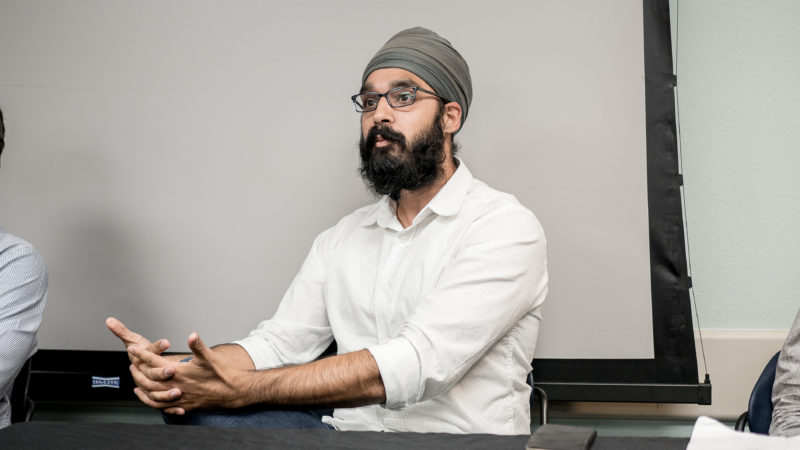Simran Jeet Singh has garnered local and national attention for his advocacy
In the context of today’s current political climate, it is important for Trinity students to have role models to look up to in order to be globally aware of and involved in what’s going on around them. Among many of these role models, Simran Jeet Singh, an assistant professor of religion, has stood out as both a teacher and activist.
Singh attended Trinity University for his undergraduate studies and loved the amount of involvement from students on campus.
“I always love how much people care about each other and the world around them. I always tell people that Trinity students are serious but they don’t take themselves too seriously, and I really like that about then,” Singh said.
Singh is the advisor for several clubs on campus, including Trinity Progressives, the Muslim Student Association and the Contemporary, where he aids the students in these organizations to think of ways to cultivate a better campus environment for everyone. Recently, one of these ideas involved Singh distributing index cards to local Muslim communities to stand in solidarity with them.
“There will be members from several different mosques that will be present and we’ll have Trinity students step forward and offer the cards and letters. We’ll also take flowers and take the time for people to talk to one another and give support,” Singh said.
Several of Dr. Singh’s students can attest to the fact that Dr. Singh is an entertaining and informative professor to have.
“Dr. Singh is super cool. He keeps the lectures fresh and throws frequent puns in. He is a great role model, and the things he does for what he believes in is very inspiring. I follow him on Facebook and Twitter and it’s always interesting to read the things he posts,” said Devina Kumar, a senior economics major currently enrolled in Singh’s special topics course on Sikhism.
While Singh is a major activist on campus, he also does a lot of work outside the university.
“I’m doing a lot of writing, interviewing and trying to speak on issues related to xenophobia and discrimination. I work for a civil rights organization based in New York City, so I spend a lot of my time working on issues related to discrimination, hate violence, racial profiling and things like that,” Singh said. “I also spend way too much time on social media, like Twitter and Facebook. I’m not cool enough to have Snapchat though.”
Kumar also noted that Dr. Singh helped his students also become involved as activists outside of campus.
“His classes have assignments that serve a greater cause. For example, in my Qur’an class, he gave us the opportunity to write a paper that would be published if it was good,” Kumar said.
Other staff members at Trinity, such as Stephen Nickle, the university’s chaplain for the past 17 years, have fond memories of Singh as a student.
“He once wanted to do a multi-faith prayer service and fundraiser, and we did something in the chapel connected with that. He was also a part of our first attempt at a religious life council. We have seven Christian fellowships, a Muslim Student Association and a Jewish Student Association, and we thought it was helpful to know what each group was doing and what we could do to strengthen those organizations. We were also able to use it as a springboard to learn more about each other’s beliefs,” Nickle said.
When asked what his motivation was for working so hard in various activist groups, Singh said, “I may not sleep as much, but at the end of the day it’s worth it for me if I can alleviate some of the real suffering that people are experiencing. That’s something that I’ve learned from people much wiser than me, and I’m just trying to continue the tradition.”
Looking at all of his work, Dr. Singh traced his activist career back to Trinity, which fostered his love of learning and getting involved. “Trinity was the place where I learned how to be an activist,” Singh said. “Every time I approached someone in the university as a student seeking to do something that was either educational or awareness-oriented, I always received unconditional support.”







